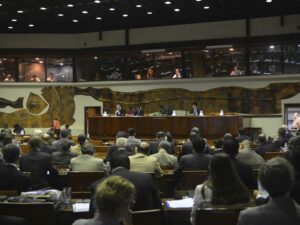
Last weekend, Canada voted against the grain on a number of United Nations General Assembly resolutions regarding Israel, Gaza and the West Bank.
In its opposition on Nov. 9 to five out of nine resolutions passed that day by two General Assembly committees, the Canadian delegation was in the minority of UN members, along with the United States and Israel, and sometimes countries including Australia, the Marshall Islands, the Federated States of Micronesia, Nauru.
According to former Canadian diplomat Jon Allen, the factors behind these decisions include trends set in motion by previous prime ministers, the influence of powerful lobbyists, Canada’s tendency to follow the United States’ lead, and a sense of imbalance among the UN General Assembly’s resolutions.
Allen is a professor of global affairs and public policy at the University of Toronto, former Canadian ambassador to Israel, Spain and Andorra, and chair of Project Rozana Canada, a not-for-profit with the objective is to build bridges between Palestinians and Israelis via the health sector.
“Under various governments up until the end of (Jean) Chretien, there was more balance in the resolutions,” Allen told CTVNews.ca in an interview on Wednesday. “We supported some. We didn’t support the others.
In the years since then, however, the needle has moved.
Canada voted against a resolution to have the UN General Assembly request the Secretary-General “take all appropriate steps” to protect Arab properties, assets and property rights in Israel.
It voted against a resolution to “condemn settlement activities in the Occupied Palestinian Territory,” and in the occupied Syrian Golan Heights, and condemn any activities involving the confiscation of land, the disruption of the livelihood of protected people, the forced transfer of civilians and the annexation of land, “whether de facto or through national legislation.
Canada was among four countries to vote against a resolution that would have the UN General Assembly express concern about the critical financial situation of UNRWA and “attempts to discredit the Agency despite its proven operational capacity and consistent implementation of its mandate.” The resolution would also call on Israel to ensure the safety of the UNRWA personnel and the protection of its institutions.
The Canadian delegation also voted against a resolution that would “recognize the right of the Palestinian people to claim restitution as a result of any exploitation, damage, loss or depletion or endangerment of their natural resources resulting from illegal measures taken by Israel, the occupying Power.”
Finally, Canada voted against a resolution that would reiterate the committee’s concern about an oil slick on the Lebanese shores created when the Israeli Air Force destroyed oil storage tanks in the direct vicinity of the Lebanese Jiyah electric power plant in 2014, causing Lebanon US$856.4 million in damage.
In the days since the two committee sessions, Canada’s position on resolutions concerning Israel has fallen under increased scrutiny and has drawn criticism by human rights organization Amnesty International.
In a statement to CTVNews.ca on Friday, Ketty Nivyabandi, secretary general of Amnesty International Canada, said she believes Canada’s voting record “reveals a concerning misalignment with global consensus” on the rights of people in the occupied Palestinian territories.
“At this pivotal moment, Canada must prioritize international law over bilateral interests to ensure that everyone’s human rights are upheld and respected impartially.”
According to a UN report on the Fourth Committee meeting, the Canadian delegation explained its position on the resolutions by reaffirming Israel’s right to defend itself and arguing that there are too many resolutions related to the Arab-Israeli conflict which single out Israel, adding that Canada will continue to vote “no” on texts that “do not address the complexity of issues.”
CTVNews.ca requested an interview with Bob Rae, Canada’s ambassador and permanent representative to the UN, to discuss the resolutions, but Rae’s office declined. Instead, Global Affairs Canada (GAC) provided a statement further elaborating on Canada’s position.
“When it comes to votes at the UN, Canada reiterates the importance of a fair-minded approach,” the statement reads. “We will continue to vote no on resolutions that do not address the complexities of the issues or address the actions of all parties. We also remain opposed to the disproportionate singling out of Israel for criticism.”
The statement says Canada does not recognize permanent Israeli control over territories occupied in 1967 – including the Golan Heights, the West Bank, East Jerusalem and the Gaza Strip.
Allen agrees with the federal government’s position that the number of resolutions on Israel effectively singles it out over other countries whose leadership has carried out acts of violence and oppression — such as Russia, North Korea, China and Myanmar — but which aren’t the subject of as many UN resolutions.
“At one point there were 22 resolutions (on Israel). Now, I think there’s about 14,” he said.
“Should there be some resolutions? Yeah. Just have two resolutions that basically say settlements are illegal and should be stopped and the occupation should be ended as soon as possible.”
However, he said there are other factors influencing Canada’s stance on the resolutions, including a trend set in motion 20 years ago and aggressive lobbying by certain interest groups.
There was a time when Canada supported a greater number of UN resolutions regarding Israel and the occupation of the Palestinian territories, Allen said, but successive prime ministers since former prime minister Jean Chretien have taken a more explicitly pro-Israeli position.
Up until the early 2000s, Allen said, Canada tended to shy away from supporting resolutions that “blamed Israel for not making peace,” but still supported a greater number of resolutions regarding Israel and the occupation of Gaza and the West Bank than it does today.
Around the time Paul Martin took office as prime minister in 2003, Allen said, the dial began to move, little by little.
“I don’t know whether he did it to please the Jewish community, but to my surprise, (because) I was in the department at the time, (Martin) changed maybe two or three resolutions,” he said.
“When (Stephen) Harper came in, he changed even more.”
Based on his various positions in Canadian diplomacy from 2001 to 2016, Allen said he believes these reversals were made partly due to what he described as lobbying by interest groups in Canada in support of minimizing criticism of Israel.
“There is a strong lobby that does not want to see resolutions condemning Israel be supported by Canada,” he said.
And despite the federal government’s insistence that it voted against four out of six of the latest draft resolutions on Israel out of a duty to fairness, Allen said he believes that if the U.S. were to change its position on the resolutions, Canada likely would, too.
“America is pushing a two-state solution now, that’s what their answer is to this war,” he said. “And if (President Joe) Biden had the guts, he would start criticizing the settlements, he would start criticizing the occupation. And I have no doubt that Canada would follow.”
The voting comes as the Hamas-run Gaza Health Ministry says more than 11,500 Palestinians have been killed in Israeli military operations since the wore broke out.
The war erupted after Hamas, a militant group deemed a terrorist organization by the Canadian government, killed some 1,200 people and seized around 240 captives in a surprise attack in Israel on Oct. 7. Israel responded with airstrikes and a ground offensive in Gaza.
The United Nations said Friday it was forced to stop deliveries of food and other necessities to Gaza because of a lack of fuel, The Associated Press reported, adding that Israel has also blocked the majority of food, water and other supplies. The AP cited aid workers as saying the trickle of aid that does make it in through Egypt is far short of what’s needed.
As a result, Palestinians trapped in Gaza are struggling to survive without electricity or running water and are rationing food, according to reporting from the Associated Press(opens in a new tab).
At the end of the day, Allen said, resolutions drafted by the General Assembly are little more than paper tigers that are neither executed nor enforced by the UN Security Council because they are non-binding.
“Everybody’s anguishing over resolutions that frankly, don’t mean very much,” he said.
“We’re talking about non-binding resolutions of the General Assembly that really, truly have no effect whatsoever. If this is not the Security Council, you’re not going to get sanctions as a result of this.”
Amnesty International’s Nivyabandi disagrees, saying it would be “misguided and regrettable” to dismiss the resolutions’ importance.
“These resolutions, including those concerning Palestinian refugees and condemning the ongoing development of illegal Israeli settlements, reflect the collective stance of the international community on vital issues,” she wrote. “They hold significant moral and political value.”
Still, Allen said if Canada is serious about wanting peace in the region, going forward, he believes it needs to advocate loudly for solving some of the specific problems standing in the way of a two-state solution, namely, root causes of the conflict including ongoing occupation and settlement efforts in Palestinian territories.
“If you go to the Canadian government website, it says settlements are illegal. It opposes the occupation. It favours a two-state solution. If that’s your policy, then why are you afraid to speak up about it when they’re expanding settlements?”
Israel has occupied the Palestinian territories of the West Bank — including East Jerusalem and the Gaza Strip since the Six-Day War of 1967. Israel has also occupied the Syrian Golan Heights since 1967.







